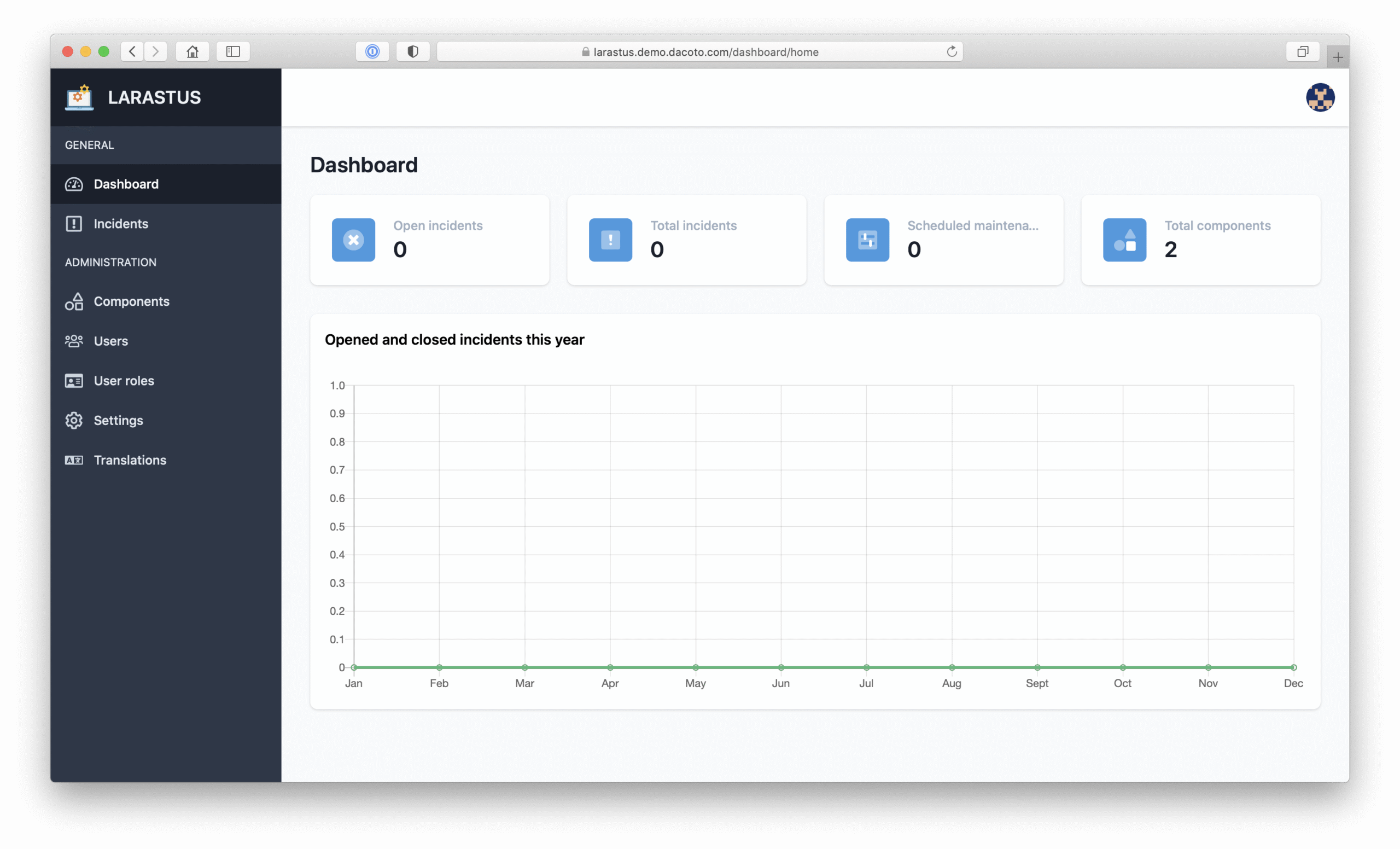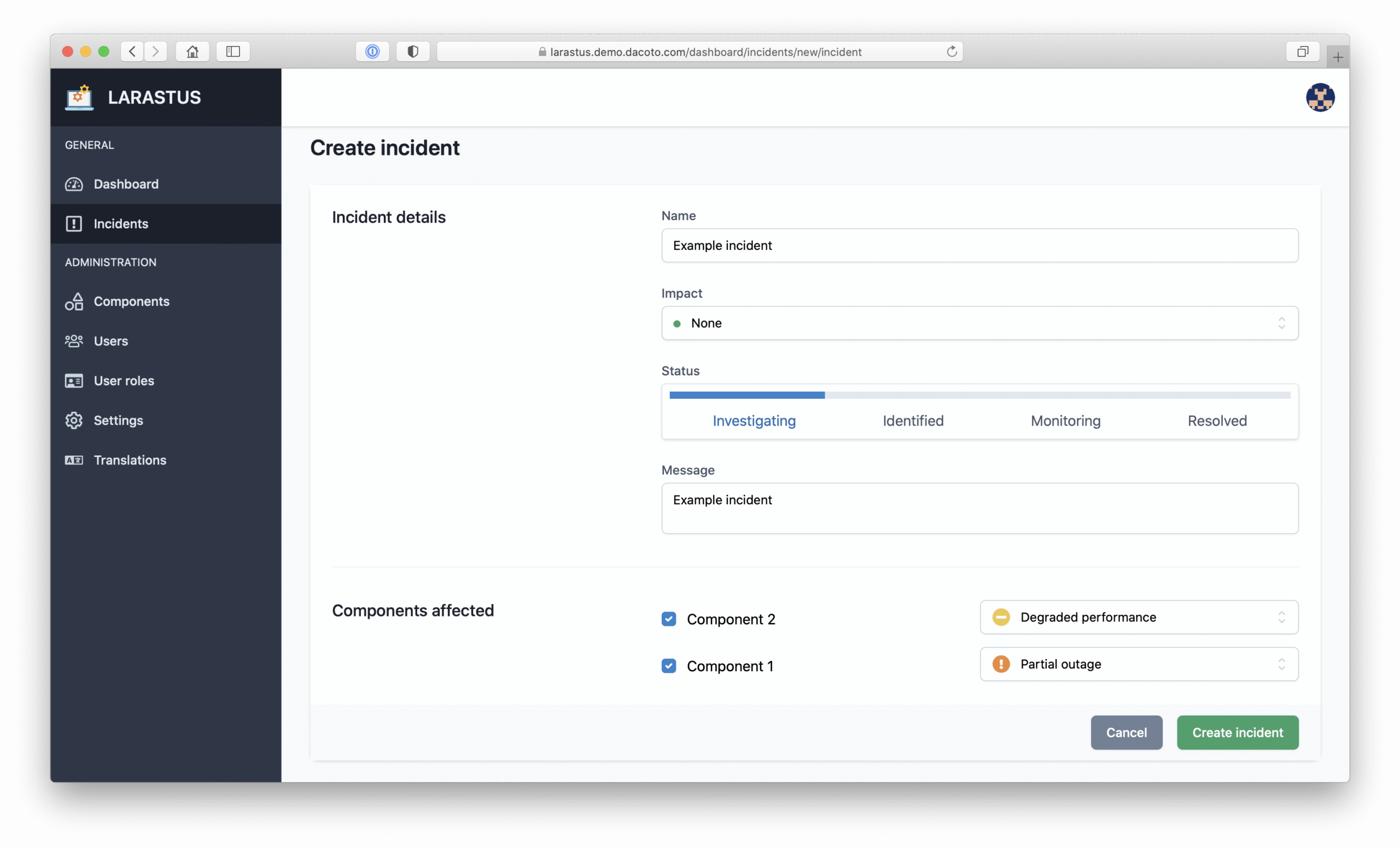Contents
- 1 1. Introduction: Unveiling Larastus – The Self-Hosted Status Page Solution
- 2 2. Key Features: Why Larastus Stands Out
- 3 3. Usability and Interface: A Seamless Experience
- 4 4. Security and Performance: Built on Solid Foundations
- 5 5. Pricing and Value: A Smart Investment
- 6 6. Pros and Cons
- 7 7. Frequently Asked Questions (FAQs)
- 7.1 Q1: What are the server requirements for Larastus?
- 7.2 Q2: Can I customize the look and feel of the status page?
- 7.3 Q3: Does Larastus support multiple services?
- 7.4 Q4: How do users get notified about incidents?
- 7.5 Q5: Is it difficult to set up Larastus?
- 7.6 Q6: Does Larastus offer an API?
- 7.7 Q7: Where can I purchase Larastus?
- 7.8 Q8: Does it support multi-language status pages?
- 8 8. Is It Worth Buying? Our Verdict on Larastus
1. Introduction: Unveiling Larastus – The Self-Hosted Status Page Solution
In an era where service reliability dictates customer satisfaction, a professional and informative status page is non-negotiable. Many businesses rely on expensive SaaS solutions, but what if you could achieve the same level of transparency and control with a one-time purchase? That’s precisely what Larastus – Status Page Software PHP script offers.
Larastus is a robust, self-hosted solution available on CodeCanyon, engineered to provide real-time updates on your service’s operational status, incidents, and maintenance schedules. Built on the modern Laravel framework with a sleek Vue.js frontend, it promises a developer-friendly setup and an intuitive user experience. If you’re looking to enhance trust with your users by proactively communicating service health, then exploring Larastus – Status Page Software is an excellent starting point for a powerful, self-managed solution.
2. Key Features: Why Larastus Stands Out
Larastus isn’t just a basic status page; it’s a feature-rich platform designed to offer comprehensive incident management and status reporting. Here’s a closer look at what makes this best PHP script for Laravel Vue a top contender:
- Intuitive Dashboard & Management Panel: At the heart of Larastus is a beautifully designed, user-friendly dashboard. From here, administrators can effortlessly add/edit services, manage incidents, schedule maintenance, and configure all aspects of their status page.
- Real-time Service Monitoring: Keep a watchful eye on your services with configurable monitoring. Larastus allows you to set up various types of monitors (e.g., HTTP/HTTPS, Ping) and define check intervals, ensuring you’re immediately aware of any downtime.
- Comprehensive Incident Management: When an issue arises, Larastus provides a structured way to manage it. You can create incidents, update their status (investigating, identified, monitoring, resolved), categorize them (minor, major, critical), and detail the impact. This keeps your users informed every step of the way.
- Scheduled Maintenance Reporting: Proactive communication is key. Larastus enables you to schedule and announce upcoming maintenance activities, preventing surprises and managing user expectations effectively.
- Customizable Status Page: Brand consistency is vital. Larastus offers extensive customization options, allowing you to tailor the look and feel of your status page to match your company’s branding, including logos, colors, and custom domains.
- Subscriber Notifications (Email & Webhook): Keep your users in the loop. Larastus supports subscriber management, allowing users to sign up for email notifications. Additionally, webhook support opens up possibilities for integrating with other services like Slack or Discord.
- Multi-Language Support: Reach a global audience. Larastus comes with multi-language capabilities, allowing you to present your status page in various languages, broadening its accessibility.
- API & Webhooks: For developers, Larastus offers an API for integration with other systems and webhooks to trigger actions based on status changes, providing immense flexibility.
- Dark Mode: A modern touch, offering a dark theme for the admin panel and public status page, enhancing user comfort, especially during extended use.
- Open Source PHP Code: The availability of the full PHP source code provides unparalleled flexibility for developers to customize, extend, or integrate Larastus into existing infrastructure. This level of control is a major advantage over proprietary SaaS solutions.
These features combine to create a powerful, self-hosted alternative to popular status page services, giving you full ownership and control over your uptime communication strategy. For a closer look and to purchase, visit the Larastus – Status Page Software page.
3. Usability and Interface: A Seamless Experience
One of Larastus’s strongest suits is its user interface. Built with Vue.js, the frontend is remarkably responsive, fast, and intuitive. Navigating the admin dashboard feels fluid, with well-organized menus and clear calls to action. Adding a new service, creating an incident, or scheduling maintenance is a straightforward process, guided by logical forms and helpful tooltips.
The public status page itself is clean, modern, and easy to understand for end-users. Service statuses are clearly indicated with color-coded icons, and incident histories are presented chronologically. Whether you’re a seasoned developer or a non-technical user, Larastus provides a pleasant and efficient experience, minimizing the learning curve and maximizing productivity. The dark mode option further enhances the visual appeal and user comfort, making it a joy to use both for administrators and visitors.
4. Security and Performance: Built on Solid Foundations
Being built on Laravel, one of the most secure and robust PHP frameworks, Larastus inherits a strong foundation for security. It leverages Laravel’s built-in security features, including protection against SQL injection, cross-site scripting (XSS), cross-site request forgery (CSRF), and robust authentication mechanisms. As a self-hosted solution, you also have full control over your server environment, allowing you to implement additional security measures as needed.
In terms of performance, the Vue.js frontend ensures a snappy and responsive user experience without heavy page reloads. The backend, optimized with Laravel’s capabilities, is designed to handle monitoring tasks efficiently without bogging down your server. Regular updates from the developer ensure that the script remains secure, performant, and compatible with the latest PHP and Laravel versions, providing peace of mind for long-term use.
5. Pricing and Value: A Smart Investment
Larastus is available on CodeCanyon, operating on a one-time purchase model. This is a significant advantage over many SaaS status page providers that charge recurring monthly or annual fees, which can quickly add up. With Larastus, you make a single payment and own the software, including access to future updates and support for a defined period.
Considering the rich feature set, the robust Laravel/Vue architecture, and the complete control you gain over your status page infrastructure, the value proposition is compelling. For businesses looking to cut down on operational costs while maintaining high standards of service transparency, Larastus offers an excellent return on investment. It’s an affordable, scalable, and customizable solution that empowers you to manage your uptime communication on your own terms.
6. Pros and Cons
| Pros ✅ | Cons ❌ |
|---|---|
| ✅ One-time purchase, no recurring fees. | ❌ Requires self-hosting and server management knowledge. |
| ✅ Full control over data and infrastructure. | ❌ Initial setup might be more complex than SaaS. |
| ✅ Feature-rich (monitoring, incidents, maintenance, notifications). | ❌ Reliance on developer updates for new features/bug fixes. |
| ✅ Highly customizable to match branding. | ❌ No dedicated mobile app (though responsive). |
| ✅ Built on modern Laravel & Vue.js for stability and speed. | ❌ Monitoring capabilities depend on your server’s resources. |
| ✅ Multi-language support. | |
| ✅ API and Webhook support for integrations. | |
| ✅ Intuitive and user-friendly interface. |
7. Frequently Asked Questions (FAQs)
Q1: What are the server requirements for Larastus?
Larastus requires a web server (Apache/Nginx), PHP 8.1 or higher, Composer, and a MySQL/PostgreSQL database. It also needs SSH access for Composer and Artisan commands.
Q2: Can I customize the look and feel of the status page?
Yes, Larastus offers extensive customization options, allowing you to change logos, colors, add custom CSS, and integrate it seamlessly with your brand identity.
Q3: Does Larastus support multiple services?
Absolutely. You can add and monitor an unlimited number of services within your Larastus instance, each with its own monitoring settings and incident history.
Q4: How do users get notified about incidents?
Users can subscribe to email notifications directly from your status page. Larastus will then automatically send out updates for new incidents, status changes, and scheduled maintenance.
Q5: Is it difficult to set up Larastus?
While it requires basic server knowledge (like setting up a Laravel application), the developer provides clear documentation to guide you through the installation process step-by-step. If you’re comfortable with PHP and server environments, you’ll find it manageable.
Q6: Does Larastus offer an API?
Yes, Larastus includes a robust API, allowing you to integrate it with other systems, automate incident creation, or pull status data programmatically. This flexibility is a huge plus for developers.
Q7: Where can I purchase Larastus?
You can purchase the official Larastus – Status Page Software PHP script directly from its listing on CodeCanyon, Envato Market’s marketplace for scripts and code.
Q8: Does it support multi-language status pages?
Yes, Larastus is built with multi-language support, allowing you to translate your status page into different languages to cater to a global audience.
8. Is It Worth Buying? Our Verdict on Larastus
After a thorough review, our verdict is a resounding yes: Larastus – Status Page Software PHP script is absolutely worth buying, especially for businesses and developers seeking a robust, self-hosted, and cost-effective status page solution. It beautifully combines the power of Laravel with the responsiveness of Vue.js, delivering a professional-grade tool that rivals expensive SaaS alternatives.
If you have the technical capability to manage a PHP application on your server, Larastus offers unparalleled control, customization, and long-term value thanks to its one-time purchase model. It empowers you to build trust with your audience through transparent communication about your service’s health, incidents, and maintenance. For anyone serious about owning their uptime communication strategy, Larastus – Status Page Software represents a smart, strategic investment that will pay dividends in user satisfaction and operational transparency.



